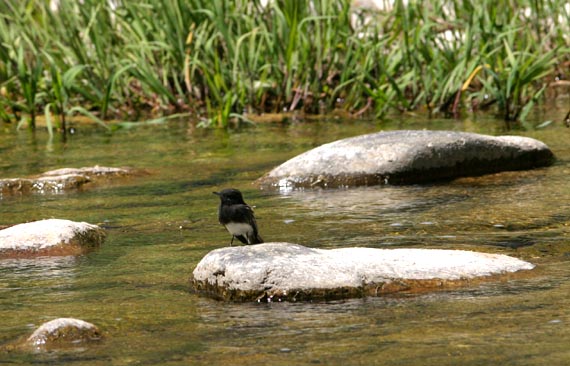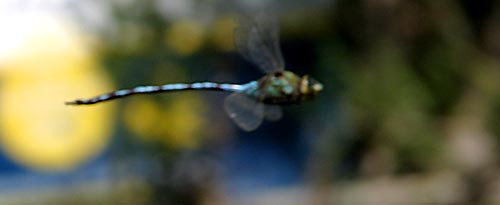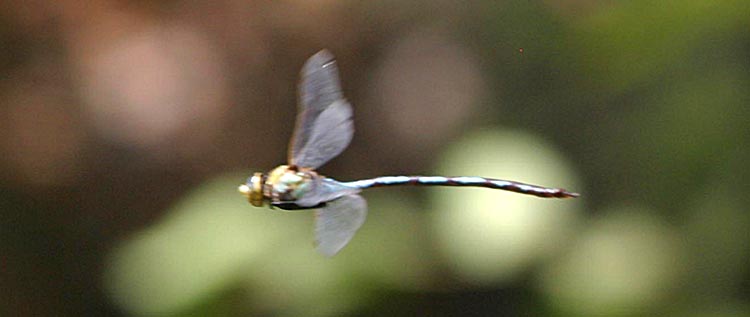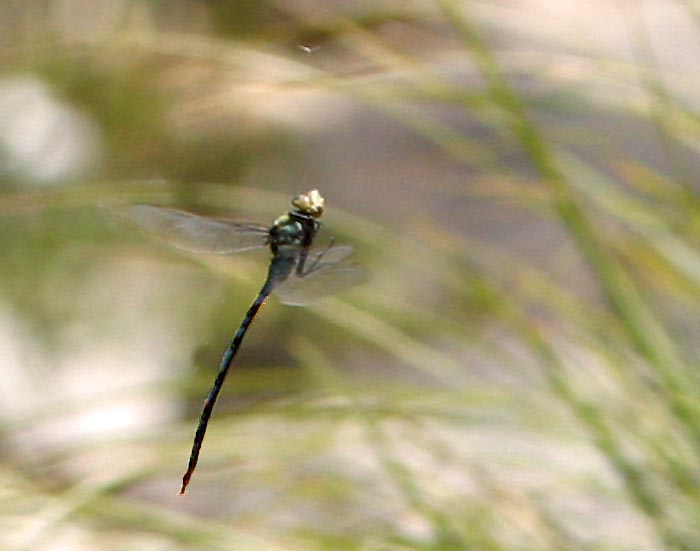|
|
 In
August the Arroyo Seco River, which runs east out of the Santa
Lucia
Mountains until it meets the Salinas River near Greenfield, is a placid
stream. Water levels are getting fairly low, except for wading pools
created
by locals as swimming spots on hot days and some deep fast stretches
through
canyons. Just upstream from where Elm Avenue (Route G16) crosses the
Arroyo
Seco — a dozen miles downstream from the Forest Service campground — is
the spot that Rita and I visited on 26 August 2006. Here a Black Phoebe
(right) foraged from exposed rocks. Those rocks that were not used by a
phoebe often had a Sooty Dancer, or an Emma's Dancer, or an American
Rubyspot. In
August the Arroyo Seco River, which runs east out of the Santa
Lucia
Mountains until it meets the Salinas River near Greenfield, is a placid
stream. Water levels are getting fairly low, except for wading pools
created
by locals as swimming spots on hot days and some deep fast stretches
through
canyons. Just upstream from where Elm Avenue (Route G16) crosses the
Arroyo
Seco — a dozen miles downstream from the Forest Service campground — is
the spot that Rita and I visited on 26 August 2006. Here a Black Phoebe
(right) foraged from exposed rocks. Those rocks that were not used by a
phoebe often had a Sooty Dancer, or an Emma's Dancer, or an American
Rubyspot. |
 We
had chosen this spot because it is (a) accessible [one can walk down to
the river from underneath the bridge], and (b) it was here that Rob
Fowler
and Steve Rovell had seen Giant Darner Anax
walsinghami
a couple of years ago, establishing a first Monterey County sight
record.
We hoped 26 August wasn't too late in the season — and it wasn't. A
fine
male Giant Darner was on patrol over this stretch of river. We
had chosen this spot because it is (a) accessible [one can walk down to
the river from underneath the bridge], and (b) it was here that Rob
Fowler
and Steve Rovell had seen Giant Darner Anax
walsinghami
a couple of years ago, establishing a first Monterey County sight
record.
We hoped 26 August wasn't too late in the season — and it wasn't. A
fine
male Giant Darner was on patrol over this stretch of river. |
 It
was very challenging, however, to get photographs and upgrade the MTY
status
from sighting to photo-documented. This darner never stopped moving —
or
if it did, we never saw it perched. It patrolled a 100 yard stretch of
rippling river, zigging and zagging to catch prey or check out what
else
was passing by. It went past the spot I'd picked as my station every
couple
minutes or so, and I tried to snap shots with manual focus as often as
I could. In all, I took 74 shots at the Giant, only nine of which shoed
an ode in anything close to focus, and only four of which (those on
this
page) might be considered 'okay' even if not really crisp. That's a
success
rate of about 5%. What may be the best shot is below. Although still a
bit fuzzy, one can see things like the paddle-shaped cerci and the
complex
blue-and-black ringed pattern on the abdomen. It
was very challenging, however, to get photographs and upgrade the MTY
status
from sighting to photo-documented. This darner never stopped moving —
or
if it did, we never saw it perched. It patrolled a 100 yard stretch of
rippling river, zigging and zagging to catch prey or check out what
else
was passing by. It went past the spot I'd picked as my station every
couple
minutes or so, and I tried to snap shots with manual focus as often as
I could. In all, I took 74 shots at the Giant, only nine of which shoed
an ode in anything close to focus, and only four of which (those on
this
page) might be considered 'okay' even if not really crisp. That's a
success
rate of about 5%. What may be the best shot is below. Although still a
bit fuzzy, one can see things like the paddle-shaped cerci and the
complex
blue-and-black ringed pattern on the abdomen. |

|
| What is actually my favorite shot is next (below). In
this picture,
the Giant has stopped in mid-air, has twisted its head to the left, and
I think it has spotted a small flying insect that you can see (barely)
at the top of the shot. It has put out its legs to help slow momentum,
planning to turn and twist and go get it. Somewhere on Kathy Bigg's
site
is a photo of a Giant Darner eating a river cruiser . . . so this tiny
fly is just a little appetizer. |

|
| |
| The Giant Darner is one of the largest
dragonflies in the world.
Manolis (2002) gives the maximum length and wingspan of males as 120mm
(4.5 inches). In west Africa there is another Anax — A.
tristis
[Giant Emperor] — which has a body length of 115mm but a wingspan of
130mm
(Silsby 2001). It is thus slightly shorter than our Giant Darner but
with
a greater wingspan. In Australia, Petalura ingentissima has a
wingspan
of up to 162mm and a body length up to 125mm, so it is even a bit
larger.
China's Tetracanthagyna plagiata can have even longer wings (up
to 168mm) but does not surpass P. ingentissima in all respects
(Silsby
2001). Our local Giant Darner is right up there with the really big
boys.
Of course, all of these sizes pale in comparison with
prehistoric dragonflies.
Back in Paleozoic times, there were giants of up to 720mm in wingspan (Maganeuropsis
permiana). That's 27 inches — over two feet across! This was 100
million
years before pterodactyls appeared and 150 million years before the
first
birds (Silsby 2001).
Nonetheless, the Giant Darner is one impressive critter,
and watching
it on patrol for over an hour gave me an even greater appreciation. We
probably could have netted it, but I just didn't have the heart to do
so.
It was most impressive on the wing.
|
|
Literature cited:
-
Manolis, T. 2002. Dragonflies and Damselflies of California. Univ. of
Calif.
Press, Berkeley.
-
Silsby, J. 2001. Dragonflies of the World. Smithsonian Instit. Press,
Washington,
D.C.
|
| PHOTOS: All photos are © 2006 Don Roberson; all
rights
reserved.
TOP
TO
PORTAL
PAGE OF DON'S ODONates
TO BIRD
FAMILIES
OF THE WORLD
TO MONTEREY
COUNTY
PAGE
TO HOME
PAGE
|